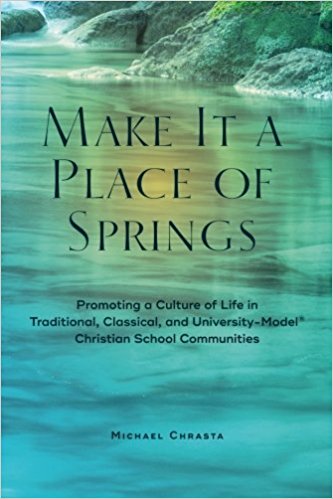Make it a Place of Springs
Michael Chrasta serves as the Director of Ministry for University-Model® Schools International (UMSI) and visited Covenant Academy last month as a team member for UMSI Certification. Having heard him speak at a national conference several years ago, I was interested in reading his recent book, Make it a Place of Springs: Promoting a Culture of Life in Traditional, Classical, and University-Model® Christian School Communities. I share his passion for family ministry, character development, and discipleship oriented discipline. His book for school stakeholders (school leaders, teachers, parents, and students), will encourage and challenge those dedicated to Christian education and training of our children.
Chrasta (2017) begins by discussing the importance of an authentic Christian school culture.
We should make sure our school culture not only reflects what we truly believe but also reveal exactly what we say it is. Any school that contains the word “Christian” in its name or statement of beliefs, but whose culture exhibits control and domination, rigidity and law, punishment and condemnation, is hypocritical and antithetical to the gospel. Although its leaders may claim to know God, it is clear that by their actions they deny Him (Titus 1:16). The fruit of such a culture will be disillusioned young people turning away from the faith in droves and an embarrassing witness for Christ in the community (p. 9).
Modeling and teaching godly virtues is an important part of building a Christian culture. “The virtuous are those who have the moral power to govern themselves and to dramatically alter the social, cultural, political, and spiritual landscapes of the world” (p. 17). Teaching the virtues is accomplished through modeling and through story-literature and biographies depicting the character of men and women worthy of imitating.
Interestingly, Chrasta (2017) identifies moral courage as the virtue most needed for our students. In teaching character at Covenant Academy, the one trait we have held in highest esteem is the virtue of integrity. Integrity is doing the right things regardless of the cost. Doing the right thing could cost you your job, a friend, or a big bonus. After pondering Chrasta’s (2017) view of moral courage, I can understand why he believes it is essential to develop in our students. It is akin to integrity, but adds the element of boldness and tenacity in response to challenges. One can have integrity without boldly proclaiming truth.
Moral courage, as Chrasta (2017) describes, is taking the initiative to do difficult things. Rather than making things easy for our children, allowing them to overcome obstacles and encouraging them to press on despite adversity, helps children develop moral courage. “Our students will influence no one if they remain timid, whiney, thin-skinned, easily offended, and introverted” (p. 30-31). Several of our students came to mind when I read this last statement-students, who know the right thing to do, may even want to do the right thing, but are timid and passive in how they live. For those interested in helping children grow in moral courage, Chrasta (2017) offers this:
Courage is bred early, in the home through discerning and purposeful parents who are intentional in forming this virtue in their children---first, through the oral presentation of great stories that seed the children’s imaginations with unforgettable images of courteous people, and second, through practice in activities that gradually present challenges (p.31).
The idea of literature being used to teach virtues is yet another reason to read aloud to your children and provide them with good books. In addition to covering the importance of character development and discipline, Chrasta (2017) also addresses the helicopter mom, social media, teaching tips, and worldview, circling back to an authentic Christian school culture. “…Biblical worldview is not only a comprehensive truth system that speaks to every area of life but also one which involves an ongoing heart transformation that leads to righteous behavior and Kingdom actions, the “good works, which God prepared in advance for us to do” (Ephesians 2:10b), (p. 249). Chrasta (2017) recommends Biblical texts (Romans 1, Ephesians 4, Colossians 2, and Psalm 1) for worldview studies-foundational truth needed to live the gospel.
Please let me know if you have other ideas for teaching moral courage. You can leave your comment below.

